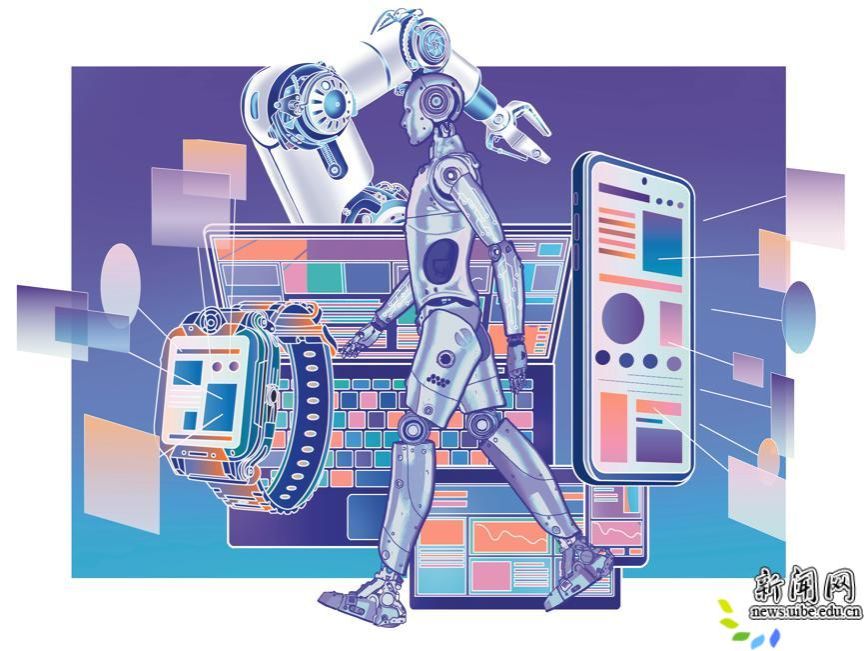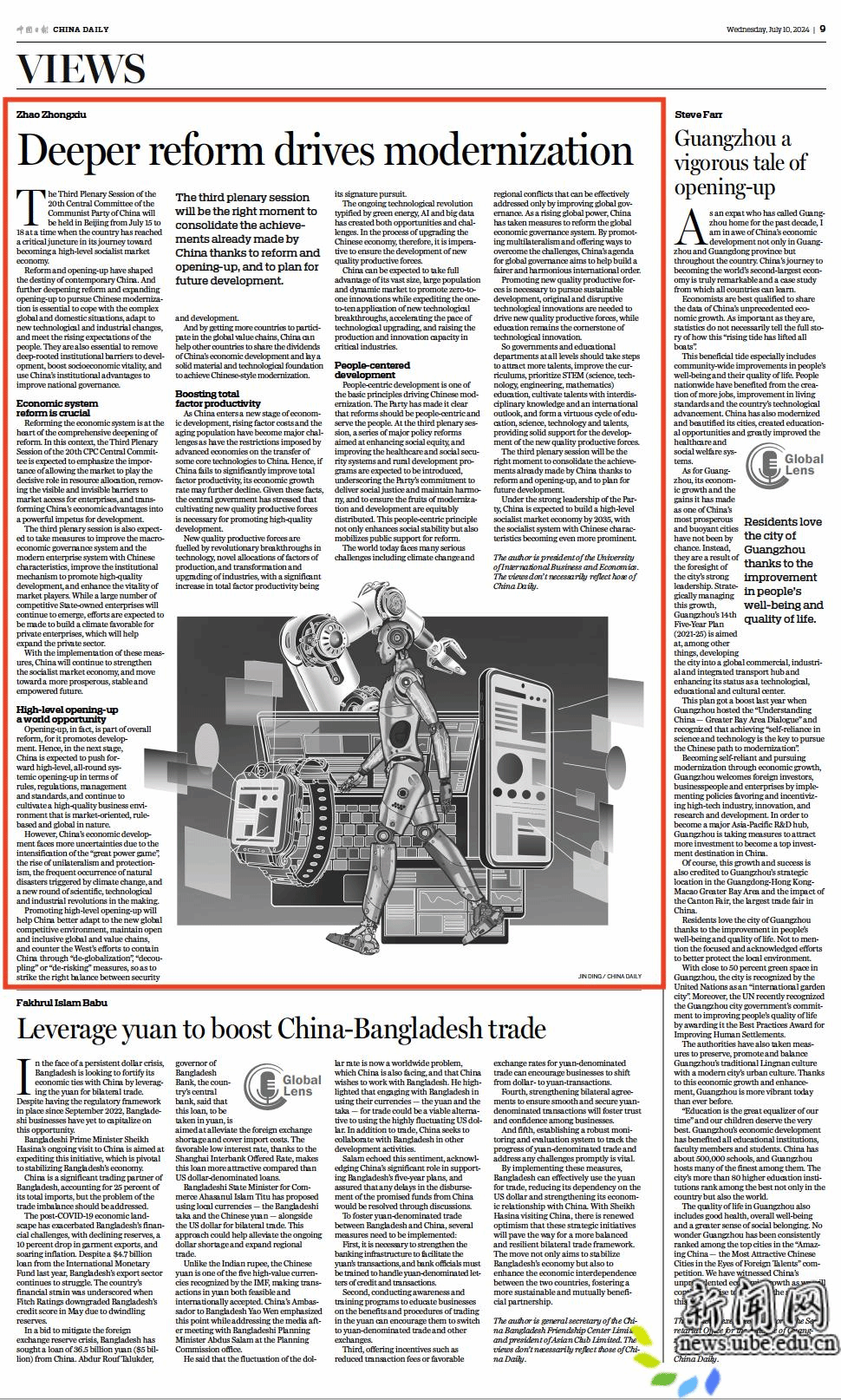来源:(中国日报 2024-07-10)
The Third Plenary Session of the 20th Central Committee of the Communist Party of China will be held in Beijing from July 15 to 18 at a time when the country has reached a critical juncture in its journey toward becoming a high-level socialist market economy.
Reform and opening-up have shaped the destiny of contemporary China. And further deepening reform and expanding opening-up to pursue Chinese modernization is essential to cope with the complex global and domestic situations, adapt to new technological and industrial changes, and meet the rising expectations of the people. They are also essential to remove deep-rooted institutional barriers to development, boost socioeconomic vitality, and use China's institutional advantages to improve national governance.
Economic system reform is crucial
Reforming the economic system is at the heart of the comprehensive deepening of reform. In this context, the Third Plenary Session of the 20th CPC Central Committee is expected to emphasize the importance of allowing the market to play the decisive role in resource allocation, removing the visible and invisible barriers to market access for enterprises, and transforming China's economic advantages into a powerful impetus for development.
The third plenary session is also expected to take measures to improve the macroeconomic governance system and the modern enterprise system with Chinese characteristics, improve the institutional mechanism to promote high-quality development, and enhance the vitality of market players. While a large number of competitive State-owned enterprises will continue to emerge, efforts are expected to be made to build a climate favorable for private enterprises, which will help expand the private sector.
With the implementation of these measures, China will continue to strengthen the socialist market economy, and move toward a more prosperous, stable and empowered future.
High-level opening-up a world opportunity
Opening-up, in fact, is part of overall reform, for it promotes development. Hence, in the next stage, China is expected to push forward high-level, all-round systemic opening-up in terms of rules, regulations, management and standards, and continue to cultivate a high-quality business environment that is market-oriented, rule-based and global in nature.
However, China's economic development faces more uncertainties due to the intensification of the "great power game", the rise of unilateralism and protectionism, the frequent occurrence of natural disasters triggered by climate change, and a new round of scientific, technological and industrial revolutions in the making.
Promoting high-level opening-up will help China better adapt to the new global competitive environment, maintain open and inclusive global and value chains, and counter the West's efforts to contain China through "de-globalization", "decoupling" or "de-risking" measures, so as to strike the right balance between security and development.
And by getting more countries to participate in the global value chains, China can help other countries to share the dividends of China's economic development and lay a solid material and technological foundation to achieve Chinese-style modernization.

JIN DING/CHINA DAILY
Boosting total factor productivity
As China enters a new stage of economic development, rising factor costs and the aging population have become major challenges as have the restrictions imposed by advanced economies on the transfer of some core technologies to China. Hence, if China fails to significantly improve total factor productivity, its economic growth rate may further decline. Given these facts, the central government has stressed that cultivating new quality productive forces is necessary for promoting high-quality development.
New quality productive forces are fuelled by revolutionary breakthroughs in technology, novel allocations of factors of production, and transformation and upgrading of industries, with a significant increase in total factor productivity being its signature pursuit.
The ongoing technological revolution typified by green energy, AI and big data has created both opportunities and challenges. In the process of upgrading the Chinese economy, therefore, it is imperative to ensure the development of new quality productive forces.
China can be expected to take full advantage of its vast size, large population and dynamic market to promote zero-toone innovations while expediting the one-to-ten application of new technological breakthroughs, accelerating the pace of technological upgrading, and raising the production and innovation capacity in critical industries.
People-centered development
People-centric development is one of the basic principles driving Chinese modernization. The Party has made it clear that reforms should be people-centric and serve the people. At the third plenary session, a series of major policy reforms aimed at enhancing social equity, and improving the healthcare and social security systems and rural development programs are expected to be introduced, underscoring the Party's commitment to deliver social justice and maintain harmony, and to ensure the fruits of modernization and development are equitably distributed. This people-centric principle not only enhances social stability but also mobilizes public support for reform.
The world today faces many serious challenges including climate change and regional conflicts that can be effectively addressed only by improving global governance. As a rising global power, China has taken measures to reform the global economic governance system. By promoting multilateralism and offering ways to overcome the challenges, China's agenda for global governance aims to help build a fairer and harmonious international order.
Promoting new quality productive forces is necessary to pursue sustainable development, original and disruptive technological innovations are needed to drive new quality productive forces, while education remains the cornerstone of technological innovation.
So governments and educational departments at all levels should take steps to attract more talents, improve the curriculums, prioritize STEM(science, technology, engineering, mathematics) education, cultivate talents with interdisciplinary knowledge and an international outlook, and form a virtuous cycle of education, science, technology and talents, providing solid support for the development of the new quality productive forces.
The third plenary session will be the right moment to consolidate the achievements already made by China thanks to reform and opening-up, and to plan for future development.
Under the strong leadership of the Party, China is expected to build a high-level socialist market economy by 2035, with the socialist system with Chinese characteristics becoming even more prominent.
The author is president of the University of International Business and Economics. The views don't necessarily reflect those of China Daily.
中文版:
中国的现代化之路:关键进程与未来展望
中国共产党第二十届三中全会将于7月15日至18日在北京召开。 在这个关键节点,中国正站在通往高水平社会主义市场经济的重要关口。
经济体制改革的深化
改革开放是决定当代中国命运的关键抉择。在新形势下,进一步全面深化改革、推进中国式现代化,是应对复杂的国际国内形势、适应新一轮科技和产业变革、满足人民群众日益增长的期待的需要。全面深化改革助于破解深层次体制机制障碍,增强经济社会活力,并把我国的制度优势转化为国家治理效能。
经济体制改革是全面深化改革的重点。展望即将召开的二十届三中全会,可期待的是,在高水平社会主义市场经济体制中,市场将在资源配置中充分发挥决定性作用,同时有为政府也将更好地发挥的作用;随着各类市场准入隐形壁垒的破除,法治引领、高效规范、公平竞争的全国统一大市场将不断完善,中国超大规模的市场、配套完整的产业体系等优势,都将转化为经济发展的强大动力;中国特色的现代企业制度将持续完善,宏观经济治理体系不断健全,有利于高质量发展的体制机制稳固建立,各类市场主体活力得以进一步激发;国资国企改革进一步深化,大批具有竞争力的国有企业持续涌现;民营企业发展环境持续优化,发展信心提升,民营经济不断发展壮大。
随着这些措施的落实,中国将不断优化社会主义市场经济体制,迈向更加繁荣、稳定和富强的未来。
高水平全方位对外开放
开放也是改革。以开放促改革、促发展,是在中国经济奇迹的重要经验。可预期的是,下一阶段高水平全方位对外开放,将稳步推进规则、规制、管理、标准等制度型开放,持续建设市场化、法治化、国际化的一流营商环境,这也是高水平的社会主义市场经济体制的重要内容。
纵观全球,大国博弈加剧,单边主义、保护主义抬头,气候变化引发自然灾害频发,新一轮科技和产业革命深入发展,我国经济发展面临的不确定性加大。 通过推进高水平对外开放,有助于更好适应国际竞争新环境, 维护全球供应链价值链的开放包容和统一性,回击“脱钩断链”等“逆全球化”措施对中国的围堵遏制,更好实现安全与发展的有机统一,并带动更多国家更深度参与全球价值链,分享中国经济发展的红利,同时也厚植中国式现代化的物质技术基础。
发展新质生产力,提高全要素生产率
我国进入新的经济发展阶段后,要素成本上升与老龄化挑战相互叠加,关键核心技术受制于人的局面尚未根本改变,若我国不能大幅提升全要素生产率,经济增速或将进一步下滑,这是我国经济高质量发展所面临的重大现实问题。在此背景下,我们对于中央提出的发展新质生产力是推动高质量发展的内在要求的观点,由衷赞同。
新质生产力由技术革命性突破、生产要素创新性配置、产业深度转型升级而催生,以全要素生产率大幅提升为核心标志,而原创性和颠覆性技术创新是新质生产力的第一驱动力。在当前以绿色能源,以及人工智能和大数据为标志的新一轮科技革命中,中国的机遇与挑战并存,在中国经济提质升级的过程中,必须续做好创新这篇大文章,推动新质生产力加快发展。
可以期待的是,中国将充分发挥大国大市场优势,推动从0到1的原始创新,以及从1到10的新技术成果市场应用,加速技术更新迭代步伐,打造面向全球的产业创新和生产能力。
以人民为本的发展
以人民为中心的发展是中国现代化的基本原则。进一步全面深化改革要坚持以人民为中心,坚持人民有所呼、改革有所应。 三中全会上,一系列旨在增强社会公平的重大政策改革可望出台,如医疗改革、社会保障改善和农村发展计划等,突显了党对社会正义和和谐的承诺, 确保现代化和发展的成果公平分配。这种以人民为中心原则,不仅增强了社会稳定,还动员了公众对改革的支持。
全球治理,中国方案
当今世界,地区冲突,气候变化等全球性问题正摆在国际社会面前,只有形成更加包容的全球治理、才能有效加以应对。
作为一个崛起的全球大国,中国积极参与全球经济治理体系改革,通过促进多边主义和提供建设性解决方案,旨在解决共同挑战,构建更公平的国际秩序。 “人类命运共同体”的理念概括了中国对和谐全球秩序的愿景。
教育和科技体制改革
加快推动新质生产力的发展是今后经济工作的重要抓手,原创性和颠覆性技术创新是新质生产力的第一驱动力,而教育是科技创新和人才培养的基石。各级政府和教育部门应加大人才引培力度,优化高等学校学科设置、注重STEM(科学、技术、工程、数学)教育与文理渗透融合,培养具有跨学科知识和创新能力,具有全球视野和国际竞争力的人才,并形成教育、科技、人才的良性循环,为发展新质生产力提供坚实的人才支撑。
结论
党的二十届三中全会将是巩固中国改革开放已有成果,规划未来发展的关键时刻。
在党中央坚强领导下,通过继续推进改革和开放,到2035年,中国有望全面建成高水平社会主义市场经济体制,中国特色社会主义制度更加完善,基本实现国家治理体系和治理能力现代化,基本实现社会主义现代化,并为在本世纪中叶全面建成社会主义现代化强国奠定坚实基础。(对外经济贸易大学校长赵忠秀)

附原文连接:
https://enapp.chinadaily.com.cn/a/202407/10/AP668dc149a31066523d471857.html
https://china.chinadaily.com.cn/a/202407/10/WS668e2067a3107cd55d26ab68.html